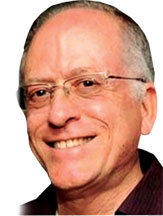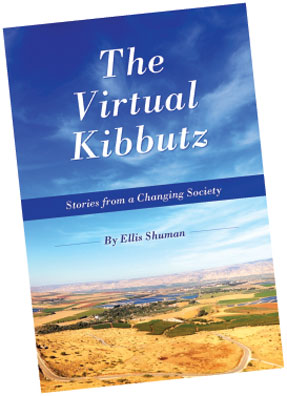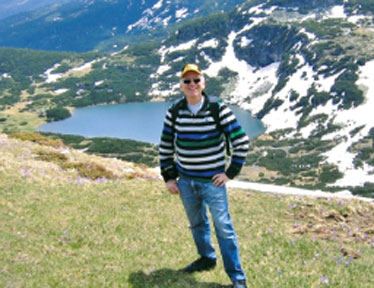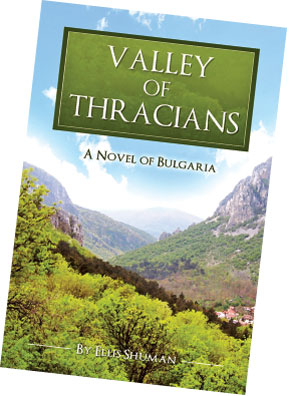|
 Interview: Interview:
Unfolding the beauty of Bulgaria through fiction
By Dilshan Boange
Falling in love, while on the job, with the country he was relocated
to perform his professional duties, led the US-born Israeli writer Ellis
Shuman to create his first novel set in the picturesque land of Bulgaria
which brims with a richness of ancient history, culture, lore and legend
that enchanted and enwrapped Shuman to conceive Valley of Thracians.
The east European country of Bulgaria is a name that surely evokes an
image much bound to exoticism and mysticism to the Sri Lankan mind. The
impressions Bulgaria and Bulgarian culture have made on the mind of
Shuman have been profound, and evidently productive to his pulse of
creativity.
A founder of the Kibbutz Yahel in the Arava Valley in Israel’s south,
Shuman is a man with diverse experience from different streams of work
which include the hotel industry, and is a former Food and Beverage
Controller at the Jerusalem Hilton. Shuman’s interests have also led him
to serve for three years as Editor in Chief of Israel Insider, an online
daily newsmagazine that developed new technologies as it posted the
latest news and views, from and about Israel.
As a writer who contributes to enlarge the stores of online
information on the internet, Shuman wrote extensively about life in
Israel in his position as the Israeli Culture Guide at About.com. He has
also designed and maintained websites for the Neve Ilan Hotel and for
Indic--Independent Israeli Cinema. Today in the Sunday Observer’s
Montage Ellis Shuman speaks of his journey as a writer, his novel Valley
of Thracians and the deep bond he shares with enchanting Bulgaria.
Excerpts:
Question: What made you become a writer? What was it like
starting out to accomplish your first work as an author?
Answer: I was born in Sioux City, Iowa, a small Midwestern
city in the very centre of the United States. My father was a
newspaperman who worked on the staff of the Sioux City Journal. I longed
to follow in my father’s footsteps.
 During summer school vacations, I wrote, edited and produced a
neighbourhood newspaper. I would go house to house, knocking on my
neighbours’ doors and inquiring about their summer activities, which I
wrote up as if they were the most interesting news stories of the
century. Then, after mimeographing copies of the newspaper, I would sell
them door to door at ten cents a copy. My first writing was therefore
nonfiction, but I wanted to write fiction as well. In school, creative
writing was my favourite subject. During summer school vacations, I wrote, edited and produced a
neighbourhood newspaper. I would go house to house, knocking on my
neighbours’ doors and inquiring about their summer activities, which I
wrote up as if they were the most interesting news stories of the
century. Then, after mimeographing copies of the newspaper, I would sell
them door to door at ten cents a copy. My first writing was therefore
nonfiction, but I wanted to write fiction as well. In school, creative
writing was my favourite subject.
History
Q: Your novel Valley of Thracians is set in Bulgaria, a land
with much history, architectural antiquity, olden ritualism that evoke a
rich cultural image to the world at large. Just like a South Asian
country would evoke a westerner as ‘exotic’, a place like Bulgaria would
strike a similar impression in a Sri Lankan. What made you place your
plot there instead of your own country of domicile? Can you offer some
insight?
A: I have lived in Israel since I was a teenager and in the
past ten years I have worked in online marketing. In 2009, much to my
surprise, my job was relocated on a two-year contract to Sofia,
Bulgaria. My wife and I decided to make the most of our Bulgarian
experience. We travelled extensively around the country, attempted (but
did not succeed) to learn to speak Bulgarian, and made many friends. We
enjoyed eating Bulgarian cuisine and learning about Bulgaria’s rich
history and culture. Bulgaria offers something for every visitor, yet
very few western tourists venture beyond its Black Sea beaches and ski
slopes.
After returning to Israel, it was obvious to me that I would stage my
novel in Bulgaria. Also, the fact that hardly any English language
fiction is set in Bulgaria made the prospect more unique to me as a
writer.
Q: How did you set about developing the plot? Have any works
of literature or film served as inspiration to conceptualise the
storyline?
A: The whole concept of my novel started with one general idea
- a Peace Corps volunteer goes missing in Bulgaria. I wondered what
would happen if that Peace Corps volunteer was never found.
Would family members give up hope, or would they come to Bulgaria and
launch their own rescue mission, even if local authorities cautioned
them that there was no hope in finding the volunteer alive?
The American Peace Corps did a tremendous job helping young
Bulgarians learn English and better their communities and lives, and
it’s a shame that the program no longer serves in the country. To make
sure that my novel was as accurate as possible, I interviewed volunteers
who had served the Peace Corps, as well as some of the program’s
Bulgarian directors.
Tribal people
In addition, travelling around Bulgaria introduced me to an ancient,
tribal people who lived in the Balkans during the time of the Romans.
The Thracians were very militaristic, yet they also developed wine
cultivation, crafted intricate jewellery in gold and silver, and left
elaborate burial tombs. Today there is no trace of the Thracians, nor is
there any record of the language they spoke. This lost people fascinated
me. I endeavoured to weave their story into the plot of the missing
Peace Corps volunteer.
My novel, Valley of Thracians, therefore, tells the story of efforts
to locate the missing volunteer, along with the story of a missing
Thracian artefact. No other books or films helped me conceptualise the
storyline, which I developed on my own.
Q: ‘Character construction’ is another weighty task for a
fiction writer that needs to be focused on apart from the plot and
storyline. Please tell us about the principal characters. How did you
develop them? Is there any particular character that you identify more
with at a personal level?
A: There are four main characters in my novel. There is the
Peace Corps volunteer who goes missing, as well as his grandfather, who
comes to Bulgaria to track down his grandson. It is not often that an
older man - a grandfather - plays the role of a protagonist in a
suspense novel.
 In addition, it was important to me to include Bulgarians as main
characters in the story. Bulgarian friends of mine who read the book
were pleased to see their countrymen described as ordinary people. If
anything, I identify more with the two Americans in the book, as both of
them arrive in Bulgaria and discover the country’s customs, history, and
people to be very colourful and unique. The visit becomes a learning
experience for them, and hopefully for the reader as well. In addition, it was important to me to include Bulgarians as main
characters in the story. Bulgarian friends of mine who read the book
were pleased to see their countrymen described as ordinary people. If
anything, I identify more with the two Americans in the book, as both of
them arrive in Bulgaria and discover the country’s customs, history, and
people to be very colourful and unique. The visit becomes a learning
experience for them, and hopefully for the reader as well.
Impression
Q: A review I read of your novel on Amazon.com was somewhat
critical of the narrative mode you had devised. The impression I got was
that the reviewer felt the switching from a first person point of view
to the third person with quick successions was in a manner that makes
the flow of action and story’s development rather cumbersome for a the
reader to digest.
What are your thoughts on that? What was your own approach as the
writer in terms of narrative approach? And as a writer do you think of
any particular kind of reader when you set out to write the story?
A: I hadn’t paid attention to that particular review, as the
overwhelming response to my book has been very positive. The characters
I created, readers said, were very believable. There are no superheroes
or secret agents in my story, but instead the story is one of ordinary
people who are pulled into unordinary situations.
Each of the main characters has a story that intersects with the
stories of the others, and I made sure to give each due attention.
Perhaps the reviewer who made the comment was eager for one storyline to
continue, without having another character’s story interrupt the flow.
As an author, I needed to put all the pieces of the puzzle into place
in a specific order before bringing all the characters together as the
book reached its suspenseful conclusion.
I think my book will appeal to all types of readers, from those who
enjoy suspense novels to anyone interested in reading a novel set in an
unusual location.
Q: Another review which yet again I read on Amazon.com about
Valley of Thracians labelled the book as a work of ‘travel fiction’ in
terms of genre while also commending it as a work of thriller fiction.
The reviewer went on to say how the detailed descriptions of
Bulgarian culture and the landscape would make it enjoyable to anyone
who would like to read and learn about Bulgaria. I must admit the term
‘travel fiction’ is something new to me in terms of classifying fiction.
So, did you have this particular category of ‘travel fiction’ as an
objective when you conceptualised Valley of Thracians which essentially
can be classified as a thriller novel?
A: I definitely consider my novel to be ‘travel fiction,’
which I define as any story that gives a strong emphasis to the location
where the action takes place. In the novel, the setting - Bulgaria - is
almost a character in the story. While my book is also a thriller, with
a suspenseful plot, as an author I made efforts to show the reader what
it’s like to be in Bulgaria.
What do the characters eat? What is their culture like? What are
their customs, traditions, and holidays? These were all things I learned
about during the two years I lived in Bulgaria. It was important for me
to share these experiences with readers.
Q: You have also published a book of short fiction titled The
Virtual Kibbutz. Could you offer some details about this collection of
short stories?
 A: After completing high school in Jerusalem, I served for
three years in the Israeli army. As part of my army service, I helped
establish a kibbutz in Israel’s southern desert. A kibbutz is a
collective, socialist community, unique to Israel. In the traditional
kibbutz all property is shared; kibbutz members take turns doing the
various jobs with payment equal for all; and the highest authority is
the members’ general assembly. A: After completing high school in Jerusalem, I served for
three years in the Israeli army. As part of my army service, I helped
establish a kibbutz in Israel’s southern desert. A kibbutz is a
collective, socialist community, unique to Israel. In the traditional
kibbutz all property is shared; kibbutz members take turns doing the
various jobs with payment equal for all; and the highest authority is
the members’ general assembly.
On the kibbutz, I worked in agriculture - planting, picking, and
sorting crops of tomatoes, pepper, onions. I also milked cows. My wife
and I lived on the kibbutz for seven years, and all three of our
children were born while we lived there.
Twenty years later, I published a collection of short stories
depicting different aspects of living on the kibbutz. The stories told
of kibbutz members and the various day-to-day problems they face. The
kibbutz today in Israel is very different from what the first kibbutz
was like when it was established over 100 years ago.
Much of the idealism and pioneering spirit has been lost in an age
when MTV and the Internet rule much of our lives. The stories in my
collection take a nostalgic look at the kibbutz as it once was, as well
as at the problems facing its uncertain future.
Q: Are you currently working on a new book? What do you see
ahead in your path as a writer?
A: Absolutely! I am currently editing my new novel, which is
again a suspense thriller. My short story collection was set in Israel,
and my first novel was set in Bulgaria. My new novel will combine my
love and appreciation for both of these countries. I won’t say anything
else about the book at this stage, just that the action highlights the
strong connection between Israel and Bulgaria.
|

